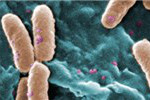 FLICKR, WELLCOME IMAGE AWARDSAs the diversity of a person’s natural killer (NK) cell repertoire increases, so too does her susceptibility to infection upon exposure to HIV, investigators from Stanford University showed in Science Translational Medicine this week (July 22).
FLICKR, WELLCOME IMAGE AWARDSAs the diversity of a person’s natural killer (NK) cell repertoire increases, so too does her susceptibility to infection upon exposure to HIV, investigators from Stanford University showed in Science Translational Medicine this week (July 22).
“It’s quite surprising, and it’s also a bit counterintuitive,” Eric Vivier, who studies NK cells at the Center for Immunology at Marseille-Luminy but was not involved in the research, told The Scientist.
NK cells are components of the innate immune system. “We think of diversity as a good thing in the immune system,” said study coauthor Dara Strauss-Albee of Stanford. “But that’s based on our paradigm which is shaped by adaptive immunity.”
 CDC, JANICE HANEY CARRMutations that confer antibiotic resistance in three different pathogenic bacteria appear to also provide the species with a growth advantage. Researchers from the Brigham and Women’s Hospital and Harvard Medical School and their colleagues found that, in antibiotic-resistant Pseudomonas aeruginosa, Acinetobacter baumannii, and Vibrio cholera isolated from mouse models and some patient samples, the presence of certain resistance-associated genes was linked to increased growth and virulence.
CDC, JANICE HANEY CARRMutations that confer antibiotic resistance in three different pathogenic bacteria appear to also provide the species with a growth advantage. Researchers from the Brigham and Women’s Hospital and Harvard Medical School and their colleagues found that, in antibiotic-resistant Pseudomonas aeruginosa, Acinetobacter baumannii, and Vibrio cholera isolated from mouse models and some patient samples, the presence of certain resistance-associated genes was linked to increased growth and virulence.
“This study calls into question the concept that antibiotic resistance leads to less virulence,” said Stuart Levy, a microbiologist who studies antibiotic resistance at the Tufts University School ...


















